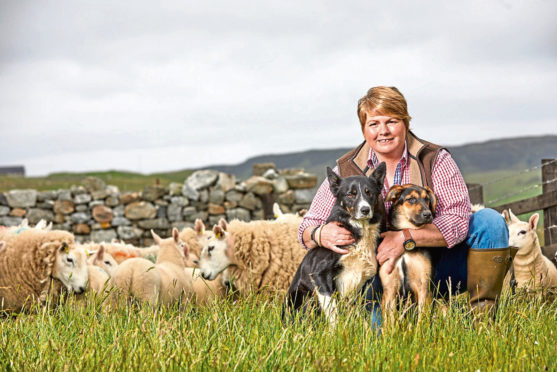Damned if you do and damned if you don’t.
That’s the phrase that comes to mind after recent attacks on social media from extreme elements – all because I’m a hill farmer.
I’m not going to bash vegans and vegetarians; I have good friends who have chosen a plant-based diet and I respect their views. It’s their life and they’ve made considered decisions on how they fuel their bodies.
I’m always mindful of the images I post and how they represent our red meat industry. A simple picture of your Scotch Lamb dinner can trigger responses from animal activists of horrific images which I suspect are heavily photo-shopped.
The arguments against livestock farming on social media have intensified with the recent success of Quality Meat Scotland’s #MeatWithIntegrity campaign and this week’s #LoveLambWeek.
Meat With Integrity has now gone on to local radio stations across the country. It showcases the passion, pride and the world-leading welfare standards that go into the Scotch Lamb, Scotch Beef and Specially Selected Pork brands.
When I’ve shared the campaign posts there have been lots of comments from consumers who clearly get the Meat With Integrity message and want to continue to eat meat, and a recent survey shows that nearly 90% of Scottish people think farming is important to economic growth.
The public want to see more produce raised and grown locally, with an emphasis on animal welfare and environmental protection. With effort by all of us, we can deliver on all these points.
There have been comments from New Zealand, Welsh and Irish farmers demanding a similar approach from their red meat promotion organisations, which tells me we’re on the right track.
What’s disappointing are the personal attacks I’ve received from fellow farmers and industry commentators for what they see as my shortcomings, especially with my use of social media.
It has even been suggested that I haven’t been promoting our beef sector enough during the ongoing industry crisis.
An arable farmer chastised me for celebrating the rewetting of our local hill ground, which was tinder dry this spring.
In mid-May, over 22,000 acres of neighbouring land was burnt out of season, destroying ground-nesting bird sites and precious peatland which holds huge carbon sinks. At the same time, the rewilding lobby suggest I’m not doing enough to protect my hill.
Being involved with the Women In Agriculture Task Force, I’ve learnt to grow a thick skin and love the haters.
I understand that there are women and men who don’t see any need for change, but for everyone against change, there are many more keen to see a more diverse, inclusive and equal representation of women at all levels of Scottish Agriculture. As one lady recently commented : “They do know it’s 2019?”
On social media I always try to treat others as I would like to be treated – with respect. It takes the same amount of time to write a nice comment as a nasty one, so be kind and don’t be dragged into a negative vortex.
If we want all of our industry to survive, this is the time to help lift each other up and enable the public to make informed choices.
If each of us involved within agriculture wrote one positive post each day on something good we did that day, no matter how small, on a social media platform, imagine how powerful a message that would carry to the consumers of all our produce and the difference we could all make for each other.










